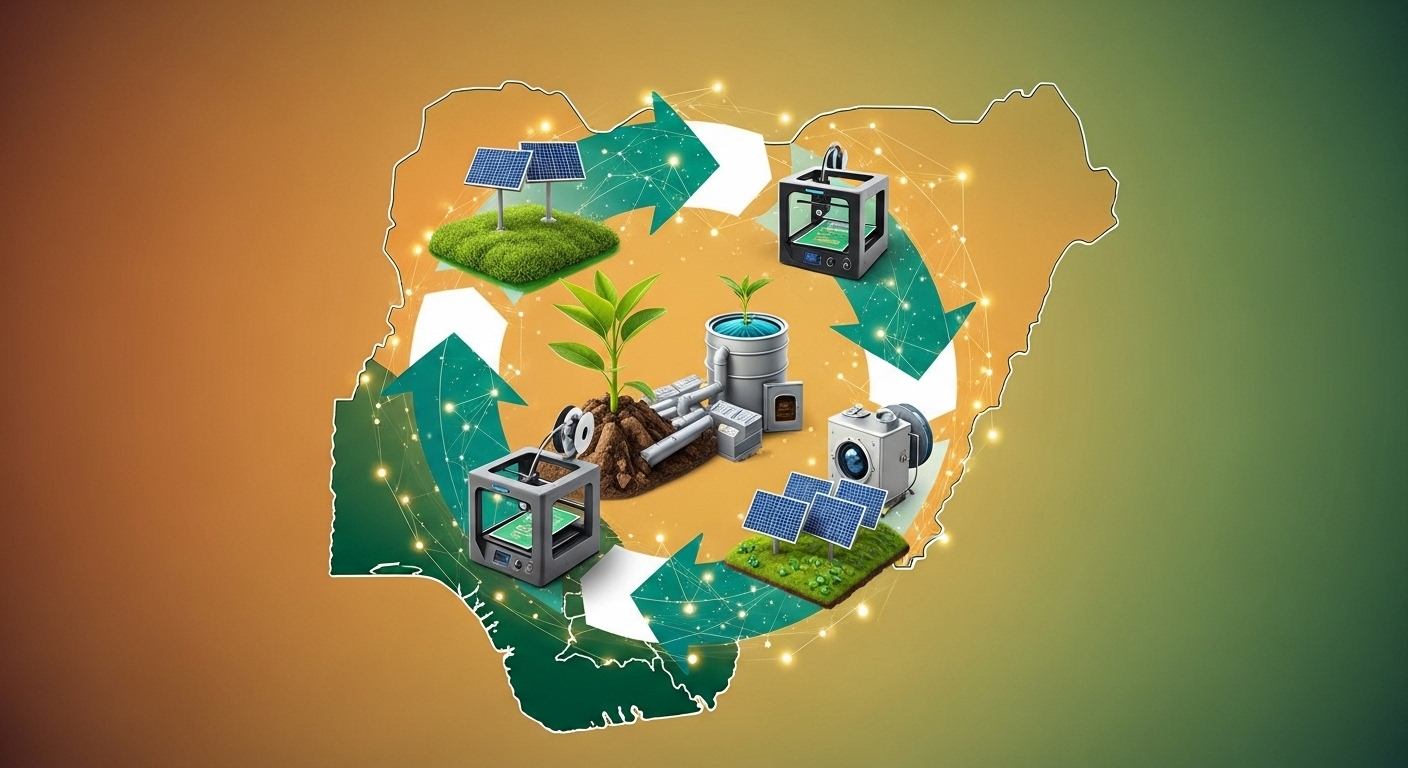Digital innovations are transforming circular economy businesses in West Africa, unlocking new growth for SMEs while revealing stark divides in awareness, skills, and funding.
This feature on the "Digital Innovations for Circular Economy Report" explores how digital adoption shapes progress, and what it will take to make sustainability truly inclusive for all.
Turning Waste into Worth: Africa's New Circular Frontier
Africa's waste challenge is intensifying, yet so is its capacity for reinvention. The continent generates more than 240 million tonnes of solid waste each year. This figure is projected to rise by 40% by 2030.
In 2025 alone, the waste management market is valued between $21 and $44 billion, driven by rapid urbanisation, stricter environmental policies, and new circular economy incentives. From plastic waste choking West African coastlines to the surge of imported e-waste reshaping urban dumps, the crisis has become both economic and environmental.
However, disruption is taking root where it's least expected. In Lagos, Accra, Abidjan, and Dakar, digital-first startups and micro-collectors are rewriting the future of recovery through apps and traceable recycling systems. This fusion of technology and entrepreneurship signals a new kind of stewardship, one turning waste into worth, and discarded materials into opportunities for wealth and resilience.
Digital Innovations - Catalysts for the Circular Shift
The push to adopt circular models has become urgent amid worsening waste and resource scarcity. Digital platforms and simple mobile tools now enable more efficient waste collection, recycling, and data traceability, holding the promise of turning yesterday's garbage into tomorrow's assets.
Across Nigeria, Ghana, Senegal, and Côte d'Ivoire, innovative SMEs and informal workers are using digital solutions to access finance, connect to buyers, and track impact in real-time.
Scale of Surveyed SME Digital Engagement
| Country | Main Circular SME Sector | % Using Digital Tools "a lot" |
|---|---|---|
| Nigeria | Waste, food, textiles | 28.8% |
| Ghana | Waste, farming | 43.8% |
| Côte d'Ivoire | Waste, digital, food | 44.6% |
| Senegal | Waste, agriculture | 57.1% |
Most respondents in all countries cite WhatsApp and Facebook as core business tools, with only a fraction using advanced tech like 3D printing or smart inventory systems.
The Real Impact - Revenue, Jobs, and Funding
Digital tool adoption has real, measurable effects. For surveyed SMEs, digital solutions boost savings and revenue but have less impact on job creation and only modest effects on accessing funding.
| Indicator | Côte d'Ivoire | Ghana | Nigeria | Senegal |
|---|---|---|---|---|
| Got Funding | 2.01 | 2.46 | 2.56 | 2.29 |
| Grew Revenue | 2.82 | 2.70 | 2.29 | 3.00 |
| Hired More Workers | 2.45 | 2.57 | 2.58 | 2.11 |
| Saved Money | 2.80 | 2.78 | 2.71 | 2.11 |
Average impact score: 1 = no impact, 5 = large impact
Impact of Digital Tool Adoption on Key Financial Outcomes Among Circular Economy SMEs in Four West African Countries.
Digital tools are most effective for growing revenue and securing savings. Yet, across the region, between 65% to 92% of SMEs report not receiving green or climate funding, revealing a critical gap for climate resilience investments.
Why Inclusive Digital Growth Matters
Despite breakthroughs, SMEs face high costs, limited training, and sparse policy support. Women, who make up a third of surveyed participants, remain marginalised, often contending with barriers such as a lack of time, family duties, and limited digital access.
Where targeted, family-friendly digital literacy and upskilling programs do exist, they drive real progress.
Major Barriers to Digital Adoption
| Challenge | % of SMEs Reporting |
|---|---|
| High Cost | 64.5% |
| Lack of Training | 48.5% |
| Fear of Fraud | 35.7% |
| Poor Internet | 25.7% |
Women's meaningful inclusion, via leadership roles, upskilling, and policy attention, is essential to equity within the ecosystem, as well as sectoral resilience and scale. As one respondent put it: "Without women in decision-making, the tools will not reach everyone who can use them best."
Roadmap to Accelerate Circular Growth
To truly realise the promise of digital innovation, leadership across sectors must drive both awareness and systemic change.
Action Table: Policy and Practice Recommendations
| Pillar | Key Actions |
|---|---|
| Digital Awareness | Launch targeted awareness and learning campaigns |
| Skills & Inclusion | Establish mobile, flexible training—focus on women |
| Infrastructure | Invest in broadband, power, shared hubs |
| Incentives | Shift policies from mandates to tax breaks, digital credits |
| Market Support | Enable SME access to e-commerce platforms, digital marketing |
Path Forward - Realising a Circular Future
West Africa's circular economy is gaining momentum, powered by digital adoption and bottom-up innovation. Reliable transformation demands focus on equity, access to funding, and robust digital infrastructure. As SMEs adapt and grow, their success will hinge on policies that support their operations, scalable technologies, and a relentless drive to leave no one behind.
To scale digital innovation and drive a thriving circular economy, SMEs need targeted training, incentives, and robust digital infrastructure. Policies must evolve beyond mandates, offering real value incentives such as tax breaks, easier access to funding, and digital credits.
Women and marginalised groups should be prioritised for digital upskilling and inclusion. If governments, investors, and community actors work together, Africa's circular economy can transform waste into wealth and build a fairer, greener future for all.










